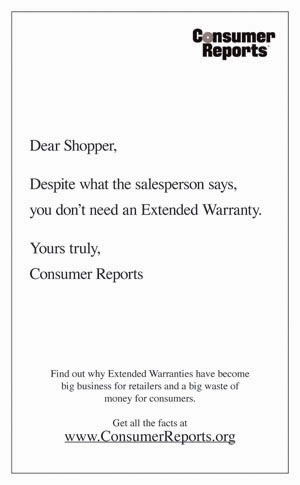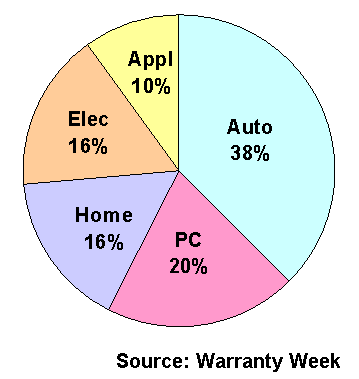November 21, 2006 |

|
ISSN 1550-9214 |
Extended Warranties:Consumer Reports says they're not needed except in a few cases. Others say they're a good value at a reasonable price. As the holiday shopping season begins, whose advice will buyers follow?Warranty Week is not an anti-extended warranty publication. We are not consumer advocates, and we most certainly aren't writing warranty advice columns for consumers. That's the job of magazines such as Consumer Reports, which recently warned consumers not to buy extended warranties. Where Consumer Reports sees the issue as black and white, we see it in lots of shades of grey. We see reasons to buy extended warranties, and reasons to avoid them. But like Consumer Reports, we just can't stand to see customers get ripped off. And when it comes to extended warranties, rip-offs can arise in numerous ways, including:
So to be more precise, Warranty Week is against the high prices charged by some retailers and dealers, who do so simply because they can. They can charge relatively high prices (as compared to the price of the product the policies cover) because they have a monopoly of opportunity and a monopoly of information. They can sell their own extended warranties or they can sell the extended warranties of third party administrators, but whatever they choose to sell will be the only service plan available on the selling floor. There is no opportunity for competitors to enter the store and approach the customer with a lower-priced offer. They might do so later, through direct mail or phone calls, or perhaps with an offer outlined on a postcard enclosed in the box of the product. They might stand outside on the public sidewalk and hand out flyers and brochures. They might even try spam email or pop-up ads on Web sites. But telemarketing and direct mail efforts have notoriously low response rates, and extended warranties are seldom sold successfully online. The Point of SaleOne retailer, in fact, will sell an appliance online but will follow-up with a personal phone call to sell the warranty. Why? Because it is otherwise so easy to say "no" to anything but a personal solicitation. It's best done face to face, but over the phone can also work if the consumer just bought the product online. It's the monopoly of opportunity: nobody else but the seller at the time of sale has a chance to sell a policy to one in five or one in three or whatever you believe to be the average acceptance rate for extended warranties. Last Tuesday morning, November 14, the USA Today newspaper carried on the back page of the "Money" section (page 10B), the following full-page ad:  At the bottom of the page the ad suggested that readers "Find out why Extended Warranties have become big business for retailers and a big waste of money for consumers," by going to the Consumer Reports Web site at www.ConsumerReoprts.org, where they would find a Special Report entitled, "Why you don't need an extended warranty." In that special report, the consumer advocates said extended warranties are "notoriously bad deals," because 1) the retailer gets to keep half or more of the premium paid, 2) the magazine's own research data shows that products seldom break within the first three years of ownership, and 3) if they do break, the cost of repair is often close to the price of an extended warranty. Two Possible ExceptionsThe special report listed two possible exceptions: rear-projection televisions (because of high failure rates) and Apple Computer products (because telephone support is free for only 90 days). It also included a table of data from its Consumer Reports National Research Center on failure rates for 25 different types of products, including laptop computers, refrigerators with built-in icemakers, rider mowers, lawn tractors, and desktop computers: Consumer Reports National Research Center | |||||||||||||||||||||||||||||||||||||||||||||||||||||||||||||||||||||||||||||||||||||||
| Product | Repair rate |
| Laptop computer | 43% |
| Refrigerator: side-by-side, with icemaker and dispenser | 37% |
| Rider mower | 32% |
| Lawn tractor | 31% |
| Desktop computer | 31% |
| Washing machine (front-loading) | 29% |
| Self-propelled mower | 28% |
| Vacuum cleaner (canister) | 23% |
| Washing machine (top-loading) | 22% |
| Dishwasher | 21% |
| Refrigerator: top- and bottom-freezer, w/ icemaker | 20% |
| Gas range | 20% |
| Wall oven (electric) | 19% |
| Push mower (gas) | 18% |
| Cooktop (gas) | 17% |
| Microwave oven (over-the-range) | 17% |
| Clothes dryer | 15% |
| Camcorder (digital) | 13% |
| Vacuum cleaner (upright) | 13% |
| Refrigerator: top- and bottom-freezer, no icemaker | 12% |
| Range (electric) | 11% |
| Cooktop (electric) | 11% |
| Digital camera | 10% |
| TV: 30- to 36-inch direct view | 8% |
| TV: 25- to 27-inch direct view | 6% |
Source: Consumer Reports National Research Center, 2006 Product Reliability Survey
Some of these failure rates are fairly high. For instance, the top seven items on the list above face better than a 1-in-4 chance of needing a repair in their third or fourth year of use. Still, the magazine said that despite those high failure rates, extended warranties were still a bad idea, because the cost of those predictable repairs would be less than the cost of an extended warranty.
The problem with this analysis is that it assumes that all extended warranties carry high prices. That's simply not the case. After looking at just two products across 40 retailers, Warranty Week found extended warranty prices ranging from 5.6% to 42% of the product's price. Now, while most people would agree that an $800 warranty on a $1900 TV is not a good deal, what about the other extreme?
The idea of an extended warranty for a digital camera was dismissed in the special report because the failure rate was said to be under 10%. But there was no mention of retailers such as B&H Photo or J&R Music who sell extended warranties that cost less than 10% of a digital camera's price. In other words, there was no concession that perhaps there is such a thing as a fair price, even for a low risk. One wonders: what if extended warranties were free? Would they still be seen as a bad investment?
Uninsured Motorists
And despite the relatively high failure rates cited for desktop and laptop computers, the magazine said consumers would be better off paying for the repairs as they're needed, rather than buying the insurance up front. That same advice -- to live without insurance -- could conceivably also be applied to fit the examples of auto insurance and maybe even health insurance, except the risks of being uninsured would be so much higher. One could conceivably "be careful" and drive around without insurance for years, perhaps putting some of the savings aside each year to help pay for the inevitable accident.
Fortunately, such a money-saving strategy is illegal in most states. Life insurance policies could also be seen as a waster of money, since such a low percentage of policy-holders will actually pass away in any given year. In fact, extended warranties are somewhat like term life insurance policies for products. If the product lives for three or four years, there's no payout, and the premium was "wasted."
The report mentioned Warranty Week in several places, though not quite in the way your editor hoped. During the initial interview with the Consumer Reports researcher, there was a long discussion about plasma TVs and the relative prices of the units and their extended warranties, culled from the data included in the October 24 issue of this newsletter. But instead of re-using any of that pricing data, the special report included just a few sentences about consumer perceptions of risk.
Holiday Sales Estimate
Your editor was also asked for an estimate of the dollar volume likely during the holiday season of 2006 for extended warranties sold on consumer electronics, major appliances, and home computers. With a little reworking of existing market sizings, an estimate of $1.6 billion was offered.
Where did that number come from? A while back, a subscriber asked us to chop up our $16 billion extended warranty market pie by type. We determined that roughly 37% was auto; 20% was computer; 16% was consumer electronics; 16% was home warranty; and 10% was major appliances. So that means 46% was of the type that interested Consumer Reports.
Extended Warranty Market
by Product Type

When asked to come up with a holiday sales estimate just for the appliance, electronics, and computer segments, we applied a range of estimates of the percentage of sales usually made in those three categories between Thanksgiving and Christmas. It's a higher percentage for gift-oriented entertainment gear than it is for washing machines. And in fact it varies from year to year depending on the number of selling days in the season. But we averaged it out to just over 21% sold at Christmas, and we assumed the same ratio for extended warranty sales.
Therefore, 46% of a $16 billion market is $7.5 billion for the three retail sectors of interest, and 21% of the $7.5 billion annual market is $1.6 billion during the Christmas period.
As for the monopoly of information on failure rates, Consumer Reports could actually play a major role in its elimination. We believe that each and every manufacturer and extended warranty administrator keeps careful statistics on actual failure rates by brand and model. We believe that many of the salesmen who are pushing extended warranties the hardest know which products are most likely to come back broken, and which will last half a lifetime.
We think the makers and the sellers have all the information on failure rates. The least informed are the buyers.
If failure rate data was readily available to customers, not only by product type, but perhaps also by brand name and maybe even by model number or configuration, buyers could conceivably steer themselves towards purchases that don't really ever need extended warranties. Conversely, the failure-prone models and brands would remain on the shelf until prices were sufficiently discounted.
German Product Testing Data
In Germany, we think there is a direct relationship between the rarity of extended warranty sales and the wide availability of reliability data. Decades ago, the German government set up the Stiftung Warentest, which is an independent foundation that produces reliability studies. And then there are dozens of local government agencies, unions, societies, and other groups that contribute their own reliability research. Rather than being prohibited from touting these findings, German manufacturers and retailer are expected to tell shoppers how they did in the latest Stiftung Warentest.
There's also the European insistence on a minimum two-year manufacturer's warranty to consider. One hears anecdotes from time to time that American computer and electronics companies whose products carry three-year warranties find it difficult to get shelf space, because retailers can't as easily sell a fourth or fifth year if the first three are free. They would rather stock brands that carry one-year warranties, or better yet, 90-day warranties.
In Europe, the first two years of warranty are always free, so there won't be any deficient 90-day warranties that need to be bolstered with an extended warranty purchase. And maybe that helps explain part of the German aversion to extended warranties. But if that were the main reason, then wouldn't England, France and Holland be in similar shape? The two-year statutory minimums have the force of law there too.
Warranty claims data could also help the consumer make the right choice, but those who know won't say. The U.S. government, for instance, has now collected details for its early warning system on 138 million automotive warranty claims, but won't share it with anybody. Consumer Reports collects and publishes reliability data, but only for subscribers. And those brands with high ratings are not supposed to tout them in their own advertising. So it's left to the news media to write reliability articles. And you know how interesting those are.
The warranty data now included in quarterly and annual reports also could help in some instances. Those who care to calculate warranty claims and accrual rates as percentages of sales for a given company can readily tell when that company deviates from its baseline. And if that company's product offering is not very broad, the deviation can sometimes be pegged on a specific product line -- sometimes even a specific customer's purchase.
But there is a limit to the usefulness of such information. Knowing that Motorola's claims are up 55% doesn't tell you which division to blame. And even if it was, say, the mobile phone operation, you still wouldn't know if it was the carrier equipment or the consumer handsets. And even if you knew it was the consumer handsets, you wouldn't know which one. And even then, you wouldn't know anything about the failure rates of Samsung, Ericsson, or Nokia, because companies based outside the U.S. don't have to report their warranty data to the SEC.
Overcharging for Extended Warranties?
It's abundantly clear that some retailers overcharge for extended warranties. We won't mention any names -- oh, who are we protecting? In the October 24 article, we shopped at nearly 40 different outlets for a Panasonic TH-42PX60U 42" plasma TV, and found the prices ranged all the way from $1348 at Wal-Mart to $1995 at Sears. More incredibly, the price of three-year extended warranties ranged from $79 at Target to $500 at Crutchfield.
One could assume, as Consumer Reports seems to think, that retailers make up for the low prices they charge for actual products by selling extended warranties at high prices. In other words, maybe Wal-Mart sells the TV cheap so they can nail you with the extended warranty? Actually, no. Wal-Mart had the seventh-cheapest extended warranty in dollar terms ($199), and was tenth in percentage terms only because the TV's price was so low to begin with.
In fact, Wal-Mart ($1547) had the third-cheapest bundled price for the plasma TV with a three-year extended warranty, behind only TV Authority ($1545) and Target ($1479). Sears ($2415) had the highest bundled price of all, and was followed closely by Crutchfield ($2400). In other words, what we found was just the opposite: that discount retailers typically sell discount warranties, and expensive retailer sell expensive warranties.
We find it difficult to ever cost-justify an extended warranty that's 20% or more of the purchase price of anything. Then again, if the product is a lawn tractor with a 31% failure rate, perhaps such a premium is actually a bargain? Conversely -- and this is where we part ways with Consumer Reports -- we find it difficult to say "no" to an extended warranty that ends up costing less than the sales tax, unless the coverage is so hobbled or the likelihood of a denied claim so high that it's not really covering anything.
Non-Payment of Valid Claims
This brings us to our second deadly rip-off: the non-payment of valid claims. This practice can take numerous forms. The most obvious is for the seller to use the premiums paid by consumers to buy a one-way ticket to the Cayman Islands or some other paradise beyond the reach of civil lawsuits. Some practitioners forget to flee the country after they pocket the premiums, however, and they usually end up paying hefty fines to state attorneys general.
Some companies have found quite legal methods to avoid paying their debts through bankruptcy proceedings that reward dubious business practices. But we must say, this technique has fortunately remained primarily in the domain of the automotive extended warranty companies, where scoundrels of years past such as Warranty Gold Ltd. and National Warranty Insurance RRG have more recently been joined by WPC Associates Inc. and Platinum Warranty Corp. One has to reach back to the Crazy Eddie days to find such miscreants in the appliance/electronic/computer sectors.
The less obvious method to avoid paying claims is to load the extended warranty's terms and conditions with so many impossible hurdles that claims can almost always be denied for some inadvertent failure to follow procedures. One furniture company insists that consumers must call in claims under their stain warranty within days of their occurrence, and that they must call in each individual stain individually. Wait a week, or wait until you have a few stains to report, and your extended warranty is useless.
Another company reportedly insisted that the consumer must keep records of their oil changes, spaced 3,000 miles apart. And they took this quite literally, so that if, say, one interval was 2,800 miles and the next was 3,200 miles, the warranty was null and void. To the right of this column, there are headlines spotlighting an auto dealer that denied a claim at 8:30am on a warranty that had run out at the stroke of the previous midnight. And there's another pointing to a company that sells radiator fluid and calls it an extended warranty.
Skimping on Coverage
And then there are those that skimp on coverage. This happens, however, more frequently at the manufacturer level than with extended warranties. For instance, Consumer Reports mentioned that Apple Computer provides free telephone support for only 90 days. And it somewhat alluded to all the electronics products that now carry one-year warranty coverage on parts but only 90-day coverage on labor. We think this policy is designed to encourage disposal instead of repair. If that wasn't the intent, then manufacturers would issue one-year product replacement warranties where all the parts were replaced at once and no labor was required.
Consumer Reports did note in its special report that rear-projection TVs seemed to be more problem-prone than either their tubular or flat-screened cousins. But what wasn't mentioned was the fact that Mitsubishi covers the screens on its rear-projection sets with only a 30-day warranty. And in dismissing the idea that digital cameras might need extended warranties, the magazine didn't report that the rechargeable batteries in Panasonic units are warranted by the manufacturer for only 10 days.
These are real deficiencies for which extended warranties can compensate. But there are numerous other instances where a good extended warranty can make up for a bad manufacturer's warranty. For instance, some manufacturers ask the consumer to pay the freight in one direction or in both directions. Others won't pay for the re-installation.
With extended warranties, the most egregious examples of abuse we can think of are policies that won't cover the replacement of some expensive failure-prone component such as the lamp in a projection TV. Technically, a lamp is a consumable product, like a light bulb or a brake pad. But if that critical item is not covered on a projection TV, what use is the policy?
Slightly less egregious are policies that will cover only one lamp replacement per contract, though we kind of see the point of this. If there were unlimited replacements allowed, it might be impossible for the obligor to remain profitable.
And then there are the obligors that will essentially cancel the policy after they pay a claim. If the claim comes early in the life of the contract, the consumer could be left uncovered for multiple years (unless they buy a new contract). The good thing is that the consumer sees the value of an extended warranty in action, having the obligor pay for the repair or the replacement. The danger is that if the consumer has inadvertently bought into an unreliable brand or model, the second or third replacement units could fail just as quickly as the first.
Of course, if we had an American version of the Stiftung Warentest, consumers wouldn't inadvertently buy junk. If those reliability ratings were published by a quasi-governmental agency instead of by a private company that didn't want its work used for commercial gain, potential buyers might even be able to see the reliability ratings on the selling floor, right next to the pricetags. But even in such a perfect world, we can still see reasons why an extended warranty might be valuable. It's not always about break-fix insurance. Sometimes all a customer needs is someone to answer their questions.
The British Model
As long as we're talking about Europe, let's mention the extended warranty report that the UK Competition Commission published towards the end of 2003. Essentially, they found no realistic method to end the high-pressure monopoly each extended warranty provider had within their own shop at the point of sale, but they did recommend that consumers be given the opportunity to change their minds and cancel their coverage once they got home. Conversely, those that declined coverage at the point of sale should be given 30 days to change their minds and buy a policy, the report concluded.
The defendants in the case, however -- the major retailers of what the British call domestic electric goods -- also made some notable points about the value of extended warranties. First, there are some consumers who simply want to buy peace of mind, knowing that their products will be repaired or replaced if that ever becomes necessary. The lack of insurance would be more upsetting to these customers than any heavy-handed sales pitch. And no amount of "just say no" advice from well-meaning consumer advocates will get them to stop buying insurance.
But second, retailers such as Dixons Group insisted that what they were also selling was advice, guidance, support, and training. It's hard to imagine what kind of advice or assistance might be needed for a tube TV, but anyone who remembers their first encounter with Microsoft Windows would readily appreciate the idea of paying for somebody to answer questions during the set-up phase. With digital products, there are numerous ways for them to get into a state where they don't work but they're not broken: misconfiguration, viruses, device conflict, etc. And in these days when everything from washing machines to music players has an operating system, perhaps there really is a role to be played by these geek squads for hire? After all, you can call your brother-in-law for computer advice only so often.
Benchmarking to Shape a Best-in-Class
Warranty Management Solution
Warranty Week has teamed up with APQC, a nonprofit benchmarking and research organization, to collect data on service after sales current practices and performance, specifically:
- interacting with customers
- managing product returns
- performing product service
- managing service repair parts
- pursuing value-adding service offerings
- recovering value through product refurbishment
How Does Your Company Rank?
Benchmark your service after sales processes against industry peers and top performers. Participate in this confidential benchmarking study at no cost to your organization. The research is sponsored by IBM.
Benchmark your organization now! Go to: www.apqc.org/warrantyweeksurvey

|
This Week’s Warranty Week Headlines | ||
|
Dell says SEC investigation "ongoing," expects another delay in filing quarterly earnings report. Press Release, November 21, 2006 | ||
|
Neither Dell nor the SEC disclose the exact nature of the issues being investigated. Finfacts Ireland, November 21, 2006 | ||
|
Industry observers speculate that Dell may have been tripped up by its method of accounting for sales of extended warranties and accruals of warranty-related liabilities. CRN, November 21, 2006 | ||
|
NHTSA now has data on 138 million auto warranty claims, 8 million consumer complaints, and 5 million field reports. Washington Post, November 21, 2006 | ||
|
John Deere says higher operating profits in fourth quarter are partially due to lower warranty expenses. Press Release, November 21, 2006 | ||
More Warranty Headlines below | ||

|
Warranty Headlines (cont’d) | ||
|
Home inspection and home warranty can help seller avoid costly repairs demanded by bidders. Aspen Daily News, November 21, 2006 | ||
|
Columnist says warranties are generally only as good as the companies offering them. Kansas City Star, November 21, 2006 | ||
|
General Motors does not approve the use of clipping to repair collision damage to vehicles Automotive Body Repair News, November 21, 2006 | ||
|
What Car? and Warranty Direct Ltd. to sell extended warranties for UK autos. Press Release, November 20, 2006 | ||
|
Mercedes is not happy with recent rankings that appeared in the Consumer Reports 2007 New Car Preview. Fortune, November 20, 2006 | ||
More Warranty Headlines below | ||

|
Warranty Headlines (cont’d) | ||
|
HP Instant Care lets service agents link to a customer's PCs over the Internet and provide personalized advice and assistance. Press Release, November 20, 2006 | ||
|
The European Commission clears Onex Corp.'s proposed acquisition of Aon Warranty Group. AFX News, November 20, 2006 | ||
|
Volkswagen owner has his claim denied because his vehicle was 8.5 hours out of warranty. KGO-TV San Francisco, November 20, 2006 | ||
|
UK insurance clerk takes an 18.9% loan to buy a used car and an extended warranty. Yorkshire Evening Post, November 20, 2006 | ||
|
Warranty industry players take issue with Consumer Reports' findings on extended warranties. Richmond Times-Dispatch, November 18, 2006 | ||
More Warranty Headlines below | ||

|
Warranty Headlines (cont’d) | ||
|
Readers sound off about the pros and cons of extended warranties. Toronto Star, November 17, 2006 | ||
|
Caterpillar Pure Confidence program offers three-year warranty on all new C7, C9, C13 and C15 engines. The Trucker, November 17, 2006 | ||
|
Peterbilt and Chevrolet rank highest in J.D. Power and Associates 2006 Medium-Duty Truck Customer Satisfaction Study. Press Release, November 17, 2006 | ||
|
California Attorney General wins $7.75 million settlement from Rent-A-Center Inc., says Preferred Customer Club promised extended warranties. Press Release, November 17, 2006 | ||
|
LG Philips LCD Ltd. opens repair and warranty service center in San Diego, its first in the U.S. Press Release, November 16, 2006 | ||
More Warranty Headlines below | ||
|
|
Warranty Headlines (cont’d) | ||
|
Turkmenistan's Ministry of Water Management opens warranty service center for Caterpillar, Komatsu and Case heavy equipment. Turkmenistan.ru, November 16, 2006 | ||
|
TVS Motor Co. begins selling extended warranties for its motorcycles in India. Zee News, India, November 15, 2006 | ||
|
Dell says it has been informed that the SEC has entered a formal order of investigation. Press Release, November 15, 2006 | ||
|
ArvinMeritor profits fall 19% due to higher warranty, health and pension costs. Press Release, November 14, 2006 | ||
|
Home Warranty Association of California cites low complaint rate and low claims denial rate for industry. Press Release, November 14, 2006 | ||
More Warranty Headlines below | ||

|
Related Articles From Warranty Week |


